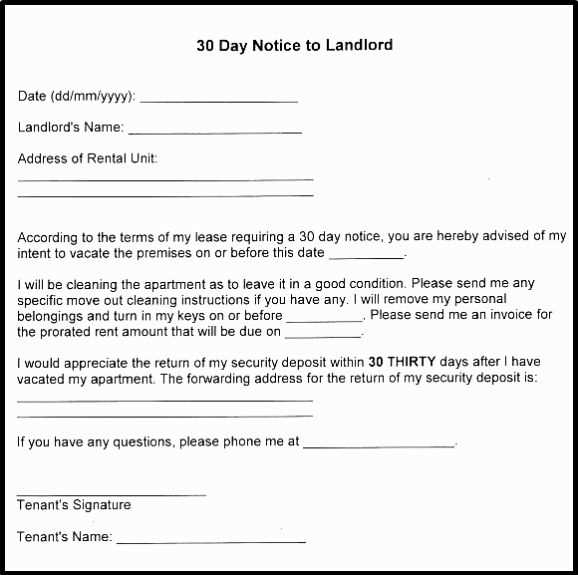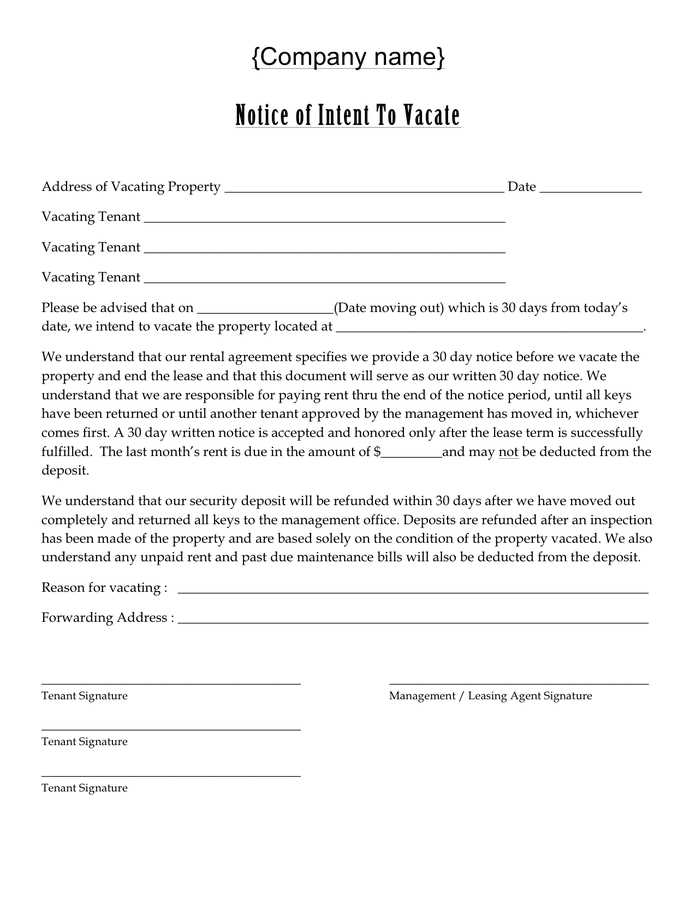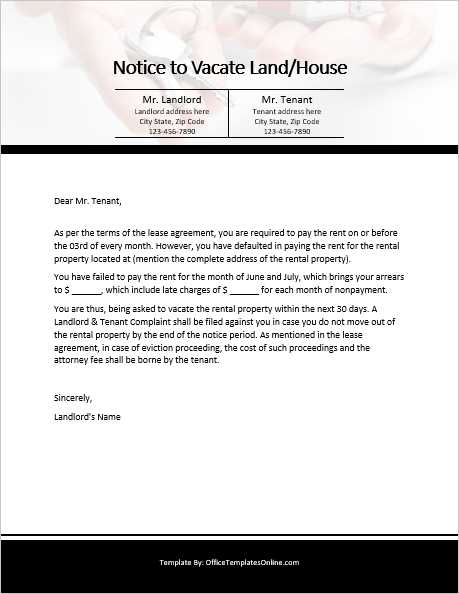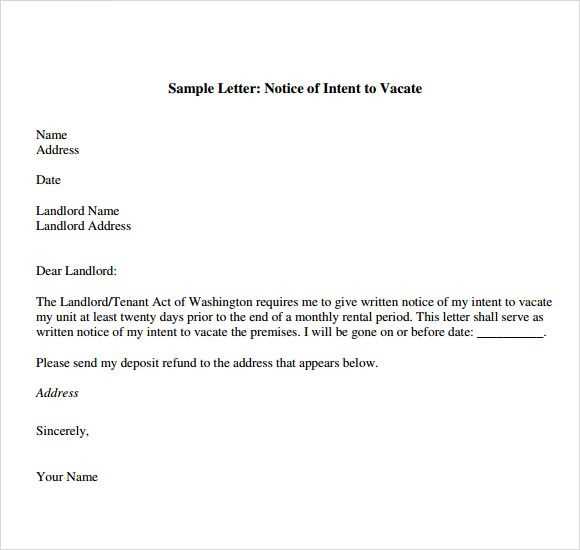Vacate Letter to Landlord Template and Guide

When moving out of a rented space, it’s essential to inform the property owner or management in writing. This formal communication is an important part of the rental process, ensuring both parties are clear on expectations and timelines. Providing notice not only fulfills contractual obligations but also sets the stage for a smooth transition.
Knowing how to craft this message properly can help avoid misunderstandings and legal complications. The written notice should include specific details about your intended move-out date, as well as any other requirements outlined in the rental agreement. While it may seem straightforward, many renters overlook the importance of structuring the communication clearly and professionally.
In this guide, we will explore key points to consider when drafting your notice and offer a practical example to follow. Whether you’re a first-time renter or have experience with moving, understanding these details will help ensure everything goes according to plan.
How to Write a Notice of Moving Out
When you’re planning to leave a rental property, it’s crucial to notify the property owner or management in writing. This communication helps ensure both parties are aware of your decision and can make necessary preparations. The key is to write a clear, concise message that outlines your intent to move out, along with any required details such as your departure date and any outstanding obligations.
Start by addressing the recipient appropriately, making sure to include their full name or title. Clearly state your intention to end the tenancy and mention the specific date you plan to vacate. If the rental agreement has any clauses related to notice periods, ensure you comply with them to avoid complications. Additionally, consider including your contact information for any follow-up or inquiries.
Lastly, while the tone should be formal, keep the language polite and professional. This is not only courteous but also helps maintain a positive relationship with the property owner, which may be beneficial for future references or settlements.
Understanding the Importance of Notice

Notifying the property owner about your decision to move out is a crucial step in the rental process. It ensures that both parties are aligned on expectations and timelines, preventing misunderstandings and potential conflicts. This formal notification serves as a clear record of your intent to end the tenancy, which can be referred to if any issues arise later.
Failure to provide sufficient notice can result in penalties, such as forfeiting your security deposit or facing legal consequences. Depending on the terms of the rental agreement, providing notice at the required time is not just courteous, but legally necessary. Adhering to this requirement demonstrates respect for the agreement you’ve made with the property owner, and it can help maintain a professional and smooth relationship.
Additionally, giving notice in advance allows the owner time to find a new tenant, which could benefit both parties. For renters, it might also provide time to finalize moving arrangements without the stress of rushing last-minute. By understanding the significance of this step, you help ensure that your transition is as seamless as possible.
Essential Elements of a Notice of Moving Out
When writing a formal communication to inform the property owner of your intent to move out, certain key details must be included to ensure clarity and completeness. These elements not only make the message effective but also help prevent any confusion regarding your departure.
The first important detail is your intended move-out date. Clearly state when you plan to vacate the property to give the property owner ample time to make necessary arrangements. This date is typically required by the terms of your rental agreement and helps both parties stay organized.
Additionally, provide your full name and the address of the rental property to avoid any ambiguity. This ensures the recipient can easily identify the specific agreement and connect your communication to your tenancy. You may also want to include your contact information for follow-up or questions.
Another essential aspect is acknowledging any remaining responsibilities, such as cleaning or returning keys. Mention whether you plan to fulfill these tasks before leaving, or if you need guidance on any outstanding duties. This shows your commitment to ensuring a smooth transition.
Common Mistakes to Avoid When Writing
While composing a formal notice to inform the property owner of your move, it’s essential to avoid common errors that can lead to confusion or miscommunication. A few simple mistakes can complicate the process, so paying attention to these key points will help ensure a smooth transition.
- Failing to include a clear move-out date: This is the most crucial part of your notice. Without a specified date, the owner might be uncertain about when you plan to leave, which can cause unnecessary delays or misunderstandings.
- Not adhering to the notice period: Check your rental agreement for the required notice period. Sending the notice too late can lead to penalties or forfeiture of your deposit.
- Using an informal tone: Even if you have a good relationship with the property owner, it’s important to maintain a professional and respectful tone. Avoid casual language or colloquialisms that could make your communication seem unprofessional.
- Neglecting to provide contact information: Always include your current contact details so the recipient can reach you if needed. This ensures a smooth follow-up and any potential clarifications.
- Forgetting to acknowledge any obligations: If there are specific tasks, such as returning keys or cleaning, be sure to mention them. Failing to acknowledge these can create confusion about your responsibilities before departure.
By avoiding these common mistakes, you ensure your communication is clear, effective, and professional, making the move-out process much easier for both you and the property owner.
Sample Notice of Moving Out

To help you get started with writing your own formal notice, here’s a simple example that you can follow. It includes all the essential elements needed to inform the property owner of your intent to leave. You can adjust the details based on your situation.
Sample Notice
Your Name
Your Address
City, State, Zip Code
Email Address
Phone Number
Recipient’s Name
Property Owner/Manager
Property Address
City, State, Zip Code
Dear [Recipient’s Name],
I am writing to inform you that I will be vacating the property located at [Address of the Rental Property]. According to the terms of our rental agreement, I am providing [required notice period, e.g., 30 days] notice. My intended move-out date is [date].
If you require any additional information or have any questions regarding my departure, please feel free to contact me at [Your Phone Number] or [Your Email Address]. I am happy to assist with any final arrangements, such as returning keys or cleaning tasks, to ensure the property is in good condition.
Thank you for your attention to this matter. I have enjoyed my time here and appreciate your assistance throughout the rental period.
Sincerely,
[Your Name]
Explanation of Key Elements

Clear Intent: The notice clearly states the intent to move out, including the property address and the move-out date. This ensures there is no confusion.
Professional Tone: The message is courteous and respectful, which helps maintain a good relationship with the property owner or manager.
Legal Considerations for Renters and Property Owners
When ending a rental agreement, both tenants and property owners must be aware of the legal implications surrounding the process. Properly following the legal steps ensures that both parties uphold their responsibilities and avoid disputes. Understanding the requirements and timeline for giving notice, as well as any additional obligations, is crucial for a smooth transition.
For tenants, it’s important to know the notice period required by the rental contract. This period can vary depending on local laws and the specific terms of the agreement. Failing to provide the correct amount of notice can lead to penalties, such as losing part or all of the security deposit. In some cases, legal action might be taken for not adhering to the notice requirements.
Property owners also have responsibilities in this process. They must acknowledge the tenant’s notice and respond promptly. If the tenant has followed the notice period correctly, the property owner is required to return the security deposit within a certain timeframe, minus any deductions for damages or unpaid rent, as allowed by law.
Additionally, both parties should document everything. Written communication serves as a record in case of future disagreements. Both renters and owners are encouraged to keep copies of all correspondence, including the move-out notice, for legal protection.